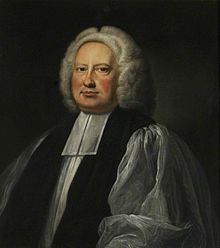This article has multiple issues. Please help improve it or discuss these issues on the talk page. (Learn how and when to remove these messages)
|
| The Most Reverend and Right Honourable John Potter | |
|---|---|
| Archbishop of Canterbury | |
 | |
| Church | Church of England |
| Diocese | Canterbury |
| In office | 1737–1747 |
| Predecessor | William Wake |
| Successor | Thomas Herring |
| Previous post(s) | Bishop of Oxford (1715–1737) |
| Orders | |
| Consecration | 15 May 1715 by Jonathan Trelawny |
| Personal details | |
| Born | c. 1674 Wakefield, Yorkshire, England |
| Died | 10 October 1747 Lambeth, London, England |
| Buried | Croydon Minster |
| Nationality | English |
| Denomination | Anglican |
| Parents | Thomas Potter |
| Spouse | Elizabeth Venner |
| Alma mater | University College, Oxford |
John Potter PC (c. 1674 – 10 October 1747) was Archbishop of Canterbury (1737–1747).
Life
He was the son of a linen draper at Wakefield, Yorkshire. At the age of fourteen he entered University College, Oxford, and in 1693 he published notes on Plutarch's De audiendis poetis and Basil's Oratio ad juvenes. In 1694 he was elected fellow of Lincoln College, Oxford and in 1697 his edition of Lycophron appeared. It was followed by his Archaeologia graeca (2 vols. 8vo, 1697–1698), the popularity of which endured till the advent of Dr William Smith's dictionaries. A reprint of his Lycophron in 1702 was dedicated to Graevius, and the Antiquities was afterwards published in Latin in the Thesaurus of Gronovius.
Besides holding several livings he became, in 1704, chaplain to Archbishop Tenison, and shortly afterwards was made Chaplain-in-Ordinary to Queen Anne. From 1708 he was Regius Professor of Divinity and canon of Christ Church Cathedral, Oxford. He married Elizabeth Venner in St. Paul's Cathedral in 1709. She being a granddaughter of Thomas Venner, a Fifth Monarchy man hanged as a traitor. In 1715 he became Bishop of Oxford. In the same year appeared his edition of Clement of Alexandria. In 1707 he published a Discourse on Church Government, and he took a prominent part in the controversy with Benjamin Hoadly, Bishop of Bangor. Even though Potter was a notable Whig, he was a High Churchman and had opposed Hoadly. Bishop Potter also ordained John Wesley a deacon in the Church of England in September 1725, and ordained him a priest in 1728.
In January 1737 Potter was unexpectedly appointed to succeed William Wake in the see of Canterbury. While in that seat, he continued to represent a High Church position, but he was also ineffective at restoring the Convocation. Alexander Pope attacked him in the 1743 version of his The Dunciad (book II, 323).
Potter died on 10 October 1747. His Theological Works, consisting of sermons, charges, divinity lectures and the Discourse on Church Government, were published in three volumes.
He was buried in Croydon Minster in Surrey.
References
- Clay, John W., ed. Publications of the Harleian Society, Registers, Vol. 26, London, 1899. p. 26
 This article incorporates text from a publication now in the public domain: Chisholm, Hugh, ed. (1911). "Potter, John". Encyclopædia Britannica. Vol. 22 (11th ed.). Cambridge University Press. pp. 211–212.
This article incorporates text from a publication now in the public domain: Chisholm, Hugh, ed. (1911). "Potter, John". Encyclopædia Britannica. Vol. 22 (11th ed.). Cambridge University Press. pp. 211–212.
| Academic offices | ||
|---|---|---|
| Preceded byWilliam Jane | Regius Professor of Divinity at Oxford 1707–1737 |
Succeeded byGeorge Rye |
| Church of England titles | ||
| Preceded byWilliam Talbot | Bishop of Oxford 1715–1737 |
Succeeded byThomas Secker |
| Preceded byWilliam Wake | Archbishop of Canterbury 1737–1747 |
Succeeded byThomas Herring |
- 1670s births
- 1747 deaths
- People from Wakefield
- Bishops of Oxford
- Archbishops of Canterbury
- 18th-century Anglican archbishops
- Alumni of University College, Oxford
- Fellows of Lincoln College, Oxford
- Members of the Privy Council of Great Britain
- People educated at Queen Elizabeth Grammar School, Wakefield
- Burials at Croydon Minster
- Regius Professors of Divinity (University of Oxford)
- 18th-century Church of England bishops
- 17th-century Anglican theologians
- 18th-century Anglican theologians